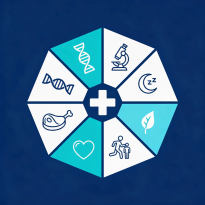Vesicotonia Diet Guide: 9 Powerful Food Rules and Stomach Care Tips
In the 8 Constitution Medicine framework, Vesicotonia is the type most vulnerable to cold and weak digestive function. The stomach, responsible for processing food and distributing energy, is the most sensitive and essential organ for this constitution. Those with Vesicotonia often struggle not because of the specific types of food they eat, but because of how much they eat and how it’s prepared.
Why Quantity Matters More Than Type
Unlike other constitutions, Vesicotonia types do not need to avoid large categories of food. Instead, their weakness lies in overeating. Even slightly exceeding their ideal portion can strain the stomach and cause fatigue, indigestion, or long-term illness. That’s why small meals and gentle digestion are at the heart of their health plan.
The Dangers of Cold Food in Vesicotonia diet
Vesicotonia types have naturally cold internal temperatures, especially in the digestive tract. Eating cold or raw food further cools the stomach, weakening its ability to process nutrients and deliver energy. Common consequences include:
- Abdominal discomfort
- Sluggish digestion
- Weak immunity
- Poor appetite
Warm, cooked meals should be the standard. Avoid cold drinks, ice, raw salads, and undercooked meat.

Sweat = Energy Loss
This constitution tends to lose energy through sweating. Excessive physical activity or heat exposure can lead to stomach fatigue. Avoid:
- Intense cardio
- Hot saunas
- Steam baths
- Overheating during workouts
Instead, choose calm, restorative movements like walking, light yoga, or stretching.
Personality and Emotional Care
Vesicotonia individuals often have an introverted and detail-focused personality. This makes them excellent planners and thinkers but also prone to overthinking and worry. To stay balanced, they benefit from:
- Cheerful, outgoing activities
- Light social engagement
- Stress-reduction routines
- Meditation or mindfulness
Warmth isn’t just physical—it’s emotional, too.
Harmful Foods for Vesicotonia diet
Here are the key foods and habits that may disrupt balance:
- Cold items: Ice cream, iced drinks, cold noodles, barley tea
- Raw foods: Sashimi, uncooked vegetables
- Proteins: Pork, egg whites
- Grains: Barley, red beans
- Seafood: Clams, shrimp, oysters, squid, octopus, carp
- Fruits: Melon, banana, pineapple, strawberry, persimmon
- Others: Perilla oil, cucumber, beer, silver
- Exercise: Heavy workouts with sweating
- Bathing: Steam rooms, hot saunas, intense half-body baths
- Color: Black or dark-colored meals or clothes
Also avoid: aloe, abalone, vitamin E, raw food therapy
Beneficial Foods for Vesicotonia diet
These foods are ideal for supporting warmth and gentle digestion:
- Proteins: Chicken, beef, goat, lamb, dog
- Grains and vegetables: Glutinous rice, white rice, brown rice, sweet potato, corn, radish, carrot, burdock, spinach, pumpkin, garlic
- Seaweed: Laver, kelp, seaweed flakes
- Warming spices: Green onion, onion, ginger, mustard, pepper, curry
- Fruits: Apple, tangerine, orange, grape, pear, mango, tomato
- Others: Roasted rice tea (sungnyung), scorched rice (nurungji), sesame oil, cinnamon, jujube, honey, royal jelly
- Exercise: Swimming, walking, meditation, yoga, cold water face rinsing
- Colors: Bright reds and yellows are energizing
They should eat everything warm—no exceptions.
Supplement Notes
Vesicotonia types respond well to:
- Ginseng
- Royal jelly
- Bee pollen
- Vitamin B complex
Avoid: Aloe, abalone, silver-based tonics, and excessive vitamin E
Lifestyle Summary for Vesicotonia
- Eat less, eat warm
- Avoid sweating too much
- Live lightly and cheerfully
- Cook all meals thoroughly
- Keep the stomach warm—always
When tired or recovering, traditional Korean dishes like Samgyetang (ginseng chicken soup) can be especially restorative.
Two-Line Summary:
Vesicotonia must manage both food quantity and temperature.
Eating less and eating warm is the key to long life and strong digestion.
For the original Korean text, visit here. If you’re curious about the basics of traditional Korean medicine and health, read the following article:
The Truth About 8 Constitution Medicine: A Revolutionary Healing Framework Explained
What Your Sleeping Position Says About Your Health
Learn Why Studying JangSang Medicine is Important.
Frequently Asked but Silly Questions (Foods Good for the Liver??)
